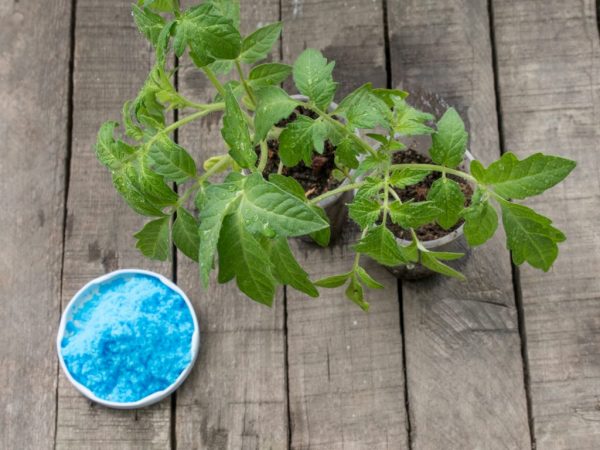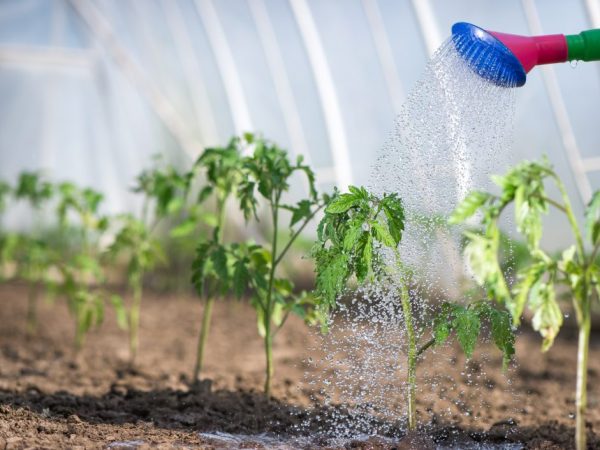Rules for processing tomatoes with copper sulfate
In the spring, every summer resident begins to think about the upcoming work on the site. Copper sulfate is an effective substance for enhancing plant immunity and obtaining a good harvest. He copes well with such insidious diseases, for example, late blight, which tomatoes are susceptible to, and others. If you do not have the right chemical remedy for plant diseases at hand, and you urgently need to process tomatoes, copper sulfate will be an excellent alternative. The main thing is to observe the proportions when diluting it with water, so as not to burn the delicate leaves of the plants.

Rules for processing tomatoes with copper sulfate
In gardening and in the garden, this drug is used not only for spraying tomatoes. It is a broad spectrum fungicide, insecticide and mineral fertilizer. It is important to distinguish between copper sulfate and iron sulfate - this is a completely different drug and has a different field of application.
Characteristics of the drug
Copper sulfate is a blue crystalline powder, an inorganic compound of copper sulfate or copper sulfate. Stable in air, readily soluble in water. Toxicity class 3. The undoubted advantage of the drug is that it is not as harmful as many antifungal pesticides. The period of effective action is about 20 days. Re-processing can be done no later than 14 days before harvest.
Interestingly, it is used not only for processing tomatoes. Copper sulfate has a wide range of applications.
Copper sulfate is used in such cases:
- For soil disinfection.
- To fertilize the site.
- For root processing.
- For spraying of various crops.
Working solution
To obtain a working solution, the powder must be diluted with water and filtered. Only then can the plants be treated with the mixture. In dry form, the powder is used only for fertilizing the site.
The concentration of the mixture is determined depending on the application. The packaging contains the manufacturer's instructions and the recommended norms for the use of the substance. Most use a 1% solution: 100 gr. powder must be diluted with 10 liters of water. To obtain a smaller amount of solution, the doses are proportionally reduced. In 1 tsp. contains 6 gr. drug. So, to get 1 liter of the finished mixture, you need to use 10 grams. powder and 1 liter of water. You can dilute the concentrate outdoors in calm weather. Use any tableware except glass and enamel. The water temperature should be around 50 ° C.
Tatiana Orlova (Candidate of Agricultural Sciences):
Note! The solution of copper sulfate should be 1%. But gardeners often prepare a solution based on the volume of the bucket. There are not 10 liters in a bucket! Even in an ordinary bucket, poured to the brim, it is only 9.5 liters. An increase in the concentration of a solution of copper sulfate leads to leaf burns. Signs of a burn: the leaves are covered with a brown netting and warped.
Application methods
In the spring, every summer resident begins to think about the upcoming work on the site. Copper sulfate is becoming an irreplaceable assistant.In diluting the solution, you must follow the instructions.
Watering

It is better to water the plants in the evening.
For soil treatment, a 3% solution is used. Receives it by diluting 30 gr. preparation for 1 liter of water. The resulting liquid must be watered the soil a week before planting or the soil for seedlings. Consumption rate 2 l / m². This is done in order to disinfect the soil from various kinds of fungi. Watering the beds is carried out in spring in dry weather, preferably in the morning or evening.
Dry application
Also, the drug is applied in a dry form as a microfertilizer on soils that are poor in organic fertilizers and humus. 1 gr. Is applied per 1 m². dry powder. More copper has a negative effect on plant roots and growth. The procedure is carried out every 5 years (for poor soils - once a year).
Tatiana Orlova (Candidate of Agricultural Sciences):
On acidic soils, copper is bound by soil acids into insoluble and therefore inaccessible to plants complexes. It is better to apply foliar application of copper-containing preparations on the leaves.
Spraying tomatoes
Copper sulfate for tomatoes is used to destroy the phytophthora fungus. This disease manifests itself in the form of dark spots on the leaves and stems, and then on the fruits. For high efficiency, it is recommended to process tomatoes according to the following scheme:
- Treatment of the soil or area before planting.
- Spraying plants during the growing season.
- Spraying fruits.
The first procedures are carried out before sowing seeds or planting seedlings - you need to treat the soil or area with a 1% solution. It is impossible to water the site in rainy weather. If these steps were missed, then after planting, spraying with 0.1% copper sulfate is carried out.
The processing of domestic tomatoes with copper sulfate is carried out in dry, calm weather in the morning or in the evening closer to sunset. You need to spray the leaves and stems, watering is not carried out under the root.
You can also spray tomatoes with Bordeaux mixture. This is the same copper sulfate, but together with slaked lime. The finished powder is sold in stores and is cheap. The main difference between Bordeaux mixture and copper sulfate is that the presence of lime makes the solution less aggressive and reduces the likelihood of burns. Copper sulfate on homemade tomatoes has a shorter useful life than on other crops. The last treatment is carried out 8 days before harvest.
Tatiana Orlova (Candidate of Agricultural Sciences):
The advantage of Bordeaux mixture over pure copper sulfate is that lime acts as an adhesive in the mixture. Copper sulfate is easily and quickly washed off the leaves even with light rains, and the Bordeaux liquid is more resistant to them. If, according to forecasts, prolonged rains are expected, it is better to use Bordeaux mixture for plant protection.
Conclusion
Copper sulfate is a useful chemical agent for the treatment and prevention of plant diseases in the garden and in the vegetable garden. Availability, ease of use and environmental friendliness make this drug popular among many summer residents.
Copper is a useful and necessary element for the development of many plants, but in excess it becomes a toxin. Getting a tasty harvest is an easy task, the main thing is compliance with the recommended doses and safety rules.



